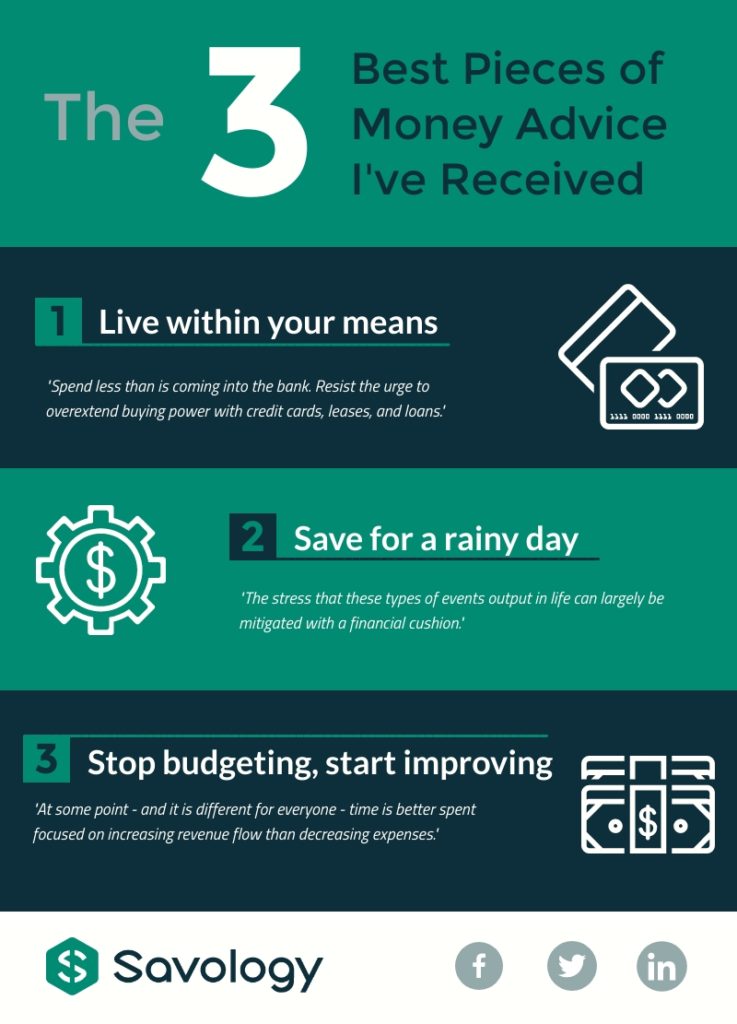There is an expanse of complex financial tools available these days. Each one promising its unique features will drive wealth accumulation the quickest. There is some truth to this, and it’s worth researching these opportunities or speaking to a financial planner in the right circumstances. That being said, the best money advice is usually not flashy, complicated, or difficult to understand. In fact, that is what makes it so great.
I’ve built my personal money philosophy around time-tested precepts; from there I identify which tools will help me build on them. I believe this approach to apply universally across any level of income. Understanding them is easy, putting them into practice requires discipline. These are what I believe to be the most fundamental smart money practices.

Live within your means
Spend less than what is going into the bank. Resist the urge to overextend buying power with credit cards, leases, and loans. Watch the inflow of your money, and carefully redirect it to maximize its impact.
Recently, after a lot of consideration and planning, my wife and I bought a home. When we applied for a mortgage, we were both blown away at how much house the bank thought we could afford. It was flattering, almost. We started looking at big, beautiful homes, and dreaming about all of the space that we would have to raise kids, cook meals, and host friends and family. Then we planned all of the things we would buy to go into our new home, and it hit us, the costs were stacking up quickly.
We took a step back. We refocused on our financial goals and strategized how we could keep our emergency fund while continuing to contribute to our retirement plan, and move into a beautiful new home all at once.
I’ve found that self-discipline is not the only difficult part of following this advice. As strange as it might sound, it can be hard to tell definitively if more money is being earned than being spent. One tool that has helped me is by utilizing an online budgeting app. I’ve also created a personal family budget to support me in this effort as well. My wife and I see every dollar that comes in and out of the account. It’s a way to hold ourselves accountable, ensure that we are in line with our financial goals, and aligned with each other.
Another approach that has helped me here is to “pay myself first”. Paying yourself first implies putting some money into your bank, before passing any on to the bill collector. Each one of our paychecks is automatically direct deposited into a retirement account before it comes into our checking account.
We choose to utilize my employer’s 401k plan, and our individual Roth IRA plans. This has helped in two ways:
1) There’s no temptation to keep money that we never see. It’s always easier to justify immediate needs and expenses, especially when times are stressful or we really want something – for us it’s travel and vacations.
2) No regular decision has to be made to invest the money. It’s not always so much that I wouldn’t choose to invest the money, it’s that I don’t take the time to transfer the funds often enough. By choosing to set up direct deposit once, we’re living within our means even if we spend 100% of the remainder our paycheck.

Save for a rainy day
The best time to repair the roof is when the sun is shining. That is to say, when there is an emergency, or financial pinch, it’s not the time to wish money was saved beforehand. The stress that these types of events output in life can largely be mitigated with a financial cushion.
My wife and I put each other through school. We both worked while completing our programs. Even still, some months we weren’t sure that we were going to make it out on top financially. It was difficult trying to balance rent, car insurance, tuition, and unexpected life expenses.
However, we quickly learned to afford ourselves a large degree of comfort by keeping an emergency fund, even during school. We generally kept six times our monthly expenses in a savings account to act as a buffer in times of unexpected large expenses. Since our primary aim was to finish school, we didn’t want a setback to force us to drop from classes. We always treated this money as if it was untouchable except in emergencies, and refilling it was priority number one in the event that is was ever used.
This principle is, in my opinion, also the best way to secure a solid credit score. With even a small amount of savings, credit cards are rarely needed. Money can essentially be loaned from the emergency fund, then repaid without any interest. This way, credit cards can be used to build credit history, increase borrowing availability (which decreases credit utilization), and leveraged for convenience and rewards.
An emergency fund is one of the ways I have sought to follow this advice. There are other things, in addition to this, that can prevent a personal financial crisis. Among them are life insurance, adequate car, home, and health insurance, and a personalized estate plan.
These wallet-friendly tips bring me to the final piece of advice that I favorited.

Stop budgeting, start improving
I’ve made more than my share of mistakes with money along the way, and this is one of them. After years spent as a student, getting by on low-wages and limited working hours, I learned to scrutinize every expense to ensure we had enough at the end of each month.
This led to under-emphasizing the most important part of building wealth – maximizing earnings.
My perception started to shift when I received this advice from a good friend during a conversation about budgeting.
I began to realize that even if I were near perfect (which I’m not) at eliminating all discretionary spending, there would still only be so much I could cut from expenses. There is limited upside to foregoing every comfort; however, there is no ceiling on earning potential.
There is a decreasing marginal return on budgeting. Herein was my mistake. I was pouring a lot of hours into making budget spreadsheets and creating complex approaches to maximize savings given my current income. This was actually hurting me financially.
Creating the perfect macro-enabled excel spreadsheet amortization schedule won’t pay down debt any faster. At some point – and it is different for everyone – time is better spent focused on increasing revenue flow than decreasing expenses. This can take the form of finding extra part-time work, creating a side-hustle, planning for promotions at work, or striving for a higher-paid career in a different industry.
I should emphasize, that without an understanding and implementation of the first two practices, this can actually be very poor advice to adhere to. There are a lot of public examples of what happens to someone with a large income but limited financial savvy or discipline. When these principles are paired together though, it will unlock the door to wealth accumulation.
Conclusion
These principles have helped us build a foundation for financial stability, and the advice has been invaluable to our family. I’ve received a lot of recommendations on what to do with our money, and I’m wary of it, especially when it is complicated, new, or nontraditional. In general, I never put my money into something I don’t understand. What I like about this approach is the simplicity. It focuses on living certain principles, then pairing the practice with the correct tools to build into prosperity.
Complete Infographic for sharing:





